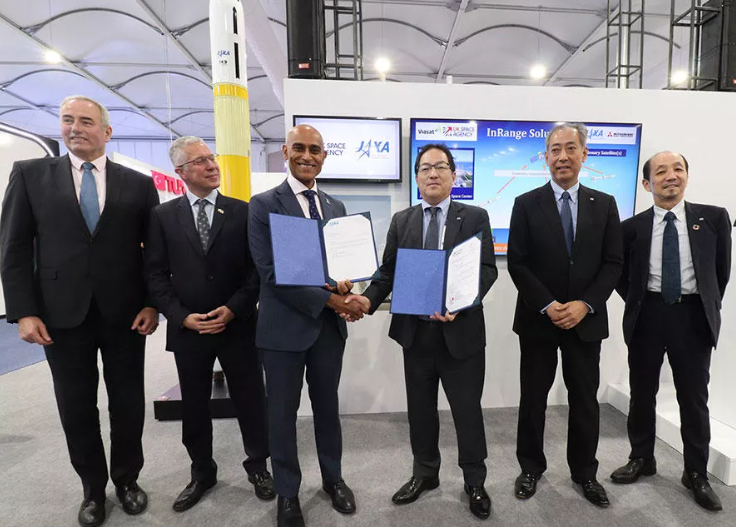UK Space Agency and JAXA to Develop Telemetry Relay Service for H3 Launch Vehicle

From left: Gary Lay, vice president of Viasat Global Government; Fergus Auld, UK ambassador in Azerbaijan; Prof. Anu Ojha, UK Space Agency; Mr. Kosaka, director of International Relations and Research Department of JAXA; President Yamakawa, JAXA, and Vice President Ishii, JAXA.
The UK Space Agency (UKSA) and Japan Aerospace Exploration Agency (JAXA) are working together to develop an in-orbit telemetry relay service to be demonstrated on the H3 launch vehicle.
The relay service, InRange, will be a new in-orbit telemetry relay service for space launch vehicles using Inmarsat-Viasat’s global L-band network. The InRange service will be designed to reduce the dependency of launch providers on traditional ground-based infrastructure by providing a global in-orbit telemetry solution.
The bilateral agreement announced Oct. 5 builds on a memorandum of cooperation signed between both space agencies in 2021. InRange is jointly funded through UKSA’s International Bilateral Fund and JAXA. UKSA awarded Viasat a contract valued at 1.7 million pounds ($2.1 million).
Viasat and Mitsubishi Heavy Industries (MHI), which develops the H3 vehicle, will work in collaboration to validate the InRange service and demonstrate the capability on an H3 launch. Japanese company NEC Space Technologies, Ltd. will also take part in this project, focusing on the L-band transmitter design which will be integrated into the H3 launch vehicle by MHI. JAXA will collaborate with the parties and play a technical role in integrating InRange into the ground infrastructure.
Atsutoshi Tamura, vice president and senior general manager of Space Systems at MHI said MHI sometimes experiences constraints during launch with limited visibility from ground stations. He said InRange can reduce those constraints and help MHI provide flexible launch services.
“The InRange service will be transformative for launch capabilities around the world, helping to make launch more sustainable by reducing both fuel needs and pressure on ground-based systems, so that spacecraft can take off on their journeys more efficiently,” commented Dr. Paul Bate, chief executive of the UK Space Agency. “[This project] puts into practice our firm belief that space is a team sport,” he added.